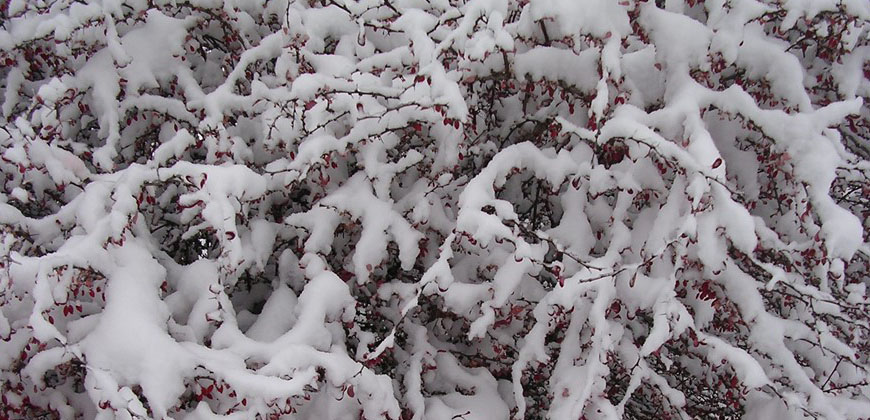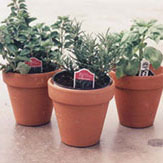
You have put your garden to bed, raked the leaves, and now you are ready for those first snows and a wintery white and sometimes brown landscape. It’s time to turn your attention to the holidays. However, it won’t be long – maybe January – until you will once again be longing for more green, some fresh veggies and, yes, even some fresh tomatoes. Here are three ways to exercise your green thumb both indoors and out and to brighten the stark winter season.
Plant fresh herbs indoors
Think about the herbs that you would like to use for those special holiday dinners and everyday cooking. Bay leaves add flavor to soups and stews. Rosemary is wonderful in breads and potatoes, and don’t forget parsley, chives, and basil for salads and main dishes. If you have tender perennials like bay leaves and rosemary in your garden, dig them out and transplant them to a clay, wood or ceramic pot. Hardy perennial herbs like parsley, sage, and chives can be divided out of your garden to grow indoors.
that you would like to use for those special holiday dinners and everyday cooking. Bay leaves add flavor to soups and stews. Rosemary is wonderful in breads and potatoes, and don’t forget parsley, chives, and basil for salads and main dishes. If you have tender perennials like bay leaves and rosemary in your garden, dig them out and transplant them to a clay, wood or ceramic pot. Hardy perennial herbs like parsley, sage, and chives can be divided out of your garden to grow indoors.
Herbs, like basil, can be planted from seed indoors and you can start harvesting once the plant starts to have lots of leaves. The important thing to remember is that herbs are sun-loving so they will do best in a south-facing window.
For more information on growing herbs indoors.
Veggies homegrown in containers
Once you have to buy the tough and tasteless store tomatoes, you will be longing for the full-flavored tomatoes you ate from your summer garden. You can grow tomatoes (and more!) indoors to continue the full flavor of homegrown produce. One tomato plant can be grown in a 6-inch pot or two plants in larger pots using recommended seeds such as Pixie, Patio, Toy Boy, Small Fry or Tiny Tim varieties. You will need to germinate the seeds first in a small pot with starter mix that is kept moist. Transplant when they are three inches tall. Light fertilization should occur about two weeks after you transplant.
What about pollination, you ask? A slight tap of the main stem and larger side branches causes the pollen to fall from the open flowers. Make sure you don’t run out of fresh tomatoes by starting a new plant every couple of weeks.
Other vegetables you might consider growing in containers this winter are salad greens, radishes, peas and carrots. Remember, you will need a longer container for the carrots.
Of course, if you really want to extend your growing season, building a cold frame, hoop house or even a simple greenhouse can be a good way to start seeds and grow winter crops. Before you do this, consider whether you want to garden year round or if you need a vacation this winter to enjoy other interests.
Cold weather container plants
The first thing to remember when planting containers outdoors is to use a container that won’t crack and break with freezing and thawing temperatures. Another trick is to select plants for two zones cooler than your hardiness zone. You can make some spectacular outdoor pots using emerald arborvitae, small conifers and ornamental cabbages and kale. Add dogwood spikes and holly berries for some extra color and voila! You have added some beauty to your landscape, entry or patios.
More information
For more information about CSU Extension, visit www.ext.colostate.edu.
CSU Extension in Larimer County
CSU Extension in Larimer County is a county-based outreach of Colorado State University Extension that provides information you can trust to deal with current issues in agriculture, horticulture, nutrition and food safety, 4-H, small acreage, money management and parenting. For more information about CSU Extension in Larimer County, call (970) 498-6000 or visit www.larimer.org/ext.
CSU Extension horticulture agent blog
Looking for additional gardening information? Check out the CSU Extension Horticulture Agent blog at www.csuhort.blogspot.com for timely updates about gardening around the state.
PlantTalk Colorado
Visit PlantTalk Colorado for fast answers to your gardening questions. PlantTalk is a cooperation between Colorado State University Extension, GreenCo and Denver Botanic Gardens.
Written by Andrea Dunn, who has received training through Colorado State University Extension’s Master Gardener program and is a Master Gardener volunteer for Larimer County.